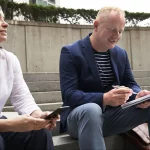How Can You Become a Better Communicator?
In the quest to become better communicators, we sought insights from a diverse group of professionals, including CEOs, founders, coaches, and consultants. They shared 17 unique strategies, ranging from mindfulness to continuous learning. Dive into their wisdom and discover how to practice mindfulness and how to improve via continuous learning, among other valuable insights.
- Practice Mindfulness
- Take in Diverse Viewpoints
- Study Books and Public Speaking
- Join Toastmasters
- Prioritize Straightforward Communication
- Try Improv Comedy
- Break into Micro Skills
- Include Online Tools
- Actively Listen
- Incorporate Storytelling
- Avoid Assumptions
- Combine Inclusivity and Empathy
- Learn from Online Videos
- Read Crucial Conversations
- Thoughtful Approach
- Balance Consistency and Novelty
- Improve via Continuous Learning
Practice Mindfulness
A pivotal shift in my communication skills occurred when I began integrating mindfulness. By fully immersing myself in the present moment, I could tune into my own feelings, thoughts, and reactions, and also become aware of the nuances of others’ viewpoints.
This application of mindfulness not only improves the substance of my discussions but also promotes healthier, richer, and more genuine relationships.
Anyone can adopt this practice as it starts with simple actions like reducing distractions, taking a few deep breaths before a conversation, and making a conscious effort to actively listen.
 Bayu Prihandito
Bayu Prihandito
Psychology Expert, Life Coach, Founder, Life Architekture
Take in Diverse Viewpoints
Exposing myself to different perspectives outside of my own has significantly enhanced my communication skills. By actively seeking out diverse viewpoints, I have gained a deeper understanding of various cultures, backgrounds, and beliefs. This has allowed me to approach conversations and interactions with empathy, openness, and a willingness to listen and learn.
It has expanded my ability to adapt my communication style to connect with individuals from diverse backgrounds, bridging potential gaps in understanding. I have become more skilled at considering different viewpoints, finding common ground, and fostering meaningful dialogue.
 Kelli Anderson
Kelli Anderson
Career Coach, Resume Seed
Study Books and Public Speaking
First, I devoured books on effective communication like a ravenous bookworm. Then, I practiced my skills in front of confused pets and unsuspecting plants. Slowly but surely, I sharpened my ability to articulate thoughts clearly.
But here’s the kicker: I didn’t stop at theory. I dove headfirst into the treacherous seas of public speaking, battling stage fright like a fearless warrior. Toastmasters, workshops, and real-life presentations became my trusty sidekicks.
Today, I stand tall as a communicator extraordinaire, armed with the power to engage, enlighten, and entertain. My journey proves that with a sprinkle of knowledge and practice, anyone can transform from a communication caterpillar to a confident orator.
 Himanshu Sharma
Himanshu Sharma
CEO and Founder, Academy of Digital Marketing
Join Toastmasters
I joined Toastmasters International as a member some years ago. It’s an inexpensive way to develop public speaking and leadership skills. Many people have heard of Toastmasters. The trick is to stick with it and go through all of the exercises. You’ll practice many elements of verbal and nonverbal communication along the way. Eventually, you can finish one of the learning pathways and earn a certification. But, that’s just the beginning.
The next step is to volunteer for a leadership role within the organization. Run a club, start a new one, become an area director, or fill any number of roles. This will pressure you into practicing your communications skills and you’ll be surrounded by supportive people along the way.
 Dennis Consorte
Dennis Consorte
Digital Marketing and Leadership Consultant for Startups, Snackable Solutions
Prioritize Straightforward Communication
For me, my first student job was a crash course in better communication skills. As a server in a busy downtown restaurant, I had to provide great customer service, collaborate with the kitchen staff, and maintain an organized front-of-house.
And I did so as an English speaker, working with a Japanese-speaking staff, and serving a Spanish-speaking clientele.
Though the circumstances were rather unique, working in a multilingual restaurant taught me about the importance of straightforward communication. When you’re dealing with quick turnaround times (not to mention two language barriers), being quick and clear in how you pass on orders and requests is an indispensable skill. I quickly learned to prioritize the customer experience and kitchen goals—and go easy on myself when my language skills failed me.
Ultimately, practical experience is the best way to improve communication skills. Communication is a muscle, and you can only improve it by putting it to regular use.
 Sebastian Morgan
Sebastian Morgan
Senior Content Specialist, CV Genius
Try Improv Comedy
I became a better communicator through my involvement in the world of improv comedy. Improv, an art form where performers create scenes and characters on the spot, requires quick thinking, adaptability, and effective communication to succeed.
I joined an amateur improv group a few years ago and immediately noticed improvements in my communication skills. The essence of improv lies in active listening and building upon what others contribute while staying focused on the scene’s narrative. This forced me to become more attentive to verbal and non-verbal cues from my fellow improvisers, allowing for seamless exchanges of dialogue.
Through countless hours of practice, I learned to respond with confidence while considering the elements that make good delivery—tone, pace, clarity—thus honing my ability to articulate ideas effectively in everyday conversations as well.
 Steve Dinelli
Steve Dinelli
Founder, MarketerInterview.com
Break into Micro Skills
In my journey to improve communication, I realized it’s unfeasible to master all facets at once. So, I dissected communication into 20 micro-skills. For instance, I focused on micro-skills like active listening to truly understand others, mastering body language for non-verbal cues, or asking insightful questions for meaningful exchanges.
Every month, I focused on one micro skill. I dedicated the first month to active listening, the next to mastering body language, and so forth. If I wasn’t satisfied with my proficiency in a skill, I took additional time. I did not get better overnight—it took me more than two years to become a better communicator.
I recommend this method to anyone who wants to enhance their communication skills in a structured manner.
 Alexandra Dubakova
Alexandra Dubakova
Head of Marketing, Freetour.com
Include Online Tools
These days, there are so many different tools online that being a bad communicator is more an exercise in laziness than an actual lack of skill. At least when it comes to writing. You can plug any of your written works into Grammarly to check your grammar, do a readability score check to see how understandable it is to the average person, put it through any number of AI programs designed to improve flow, etc.
Basically, whatever your challenge is with written communication there is most definitely a tool out there that can help you overcome it.
 Kate Kandefer
Kate Kandefer
CEO, SEOwind
Actively Listen
Before I started working on my communication, I was probably like most people. You only listen enough to formulate an answer, give a rebuttal, or have a reasonable excuse to cut someone off.
These days, I adopt active listening. My body language shows that I’m interested in what they’re saying, I ask clarifying questions (so that I make sure I’m understanding them), and I’m not afraid to pause before answering so I can gather my thoughts and say something that’s relevant to the situation.
It has been a game-changer. People are more open to talking to me, receptive to what I tell them, and generally react positively (or not as badly), even when I’m telling them something they may not want to hear.
The moral of the story is to learn to listen to what people say. Show you’re invested in the conversation. Everything else you say will carry more weight.
 Daniel Ndukwu
Daniel Ndukwu
CMO and Co-founder, DoxFlowy
Incorporate Storytelling
My communication used to have many hiccups until I found a secret. I learned that people are more interested in exemplified communication. So, I started incorporating short, interesting, and meaningful stories and examples to illustrate my points and that made me a better communicator.
It made my communication understandable, concise, and engaging. People started listening since I try to relate my stories and examples with my audience to resolve their pain points.
 Lou Reverchuk
Lou Reverchuk
Co-founder and CEO, EchoGlobal
Avoid Assumptions
We all know that listening is the most important part of communication. But equally important, is your interpretation of what is said. Most miscommunications are caused by assumptions being made of intention and meaning. This happens constantly when communicating via text and email because we have no tone or body language to read.
After a few of these miscommunications, I realized that I had to ask the person I was speaking with to make certain. That’s all it takes. If you think that someone has a negative meaning, ask them to elaborate instead of making an assumption. When we assume, we apply our own experience to someone else’s words, but those words were formed by someone with completely different experiences than our own.
 Kam Talebi
Kam Talebi
CEO, Kaskaid Hospitality
Combine Inclusivity and Empathy
Becoming a better communicator requires a profound appreciation for the significance of including everyone in the conversation by actively asking open-ended questions, encouraging diverse perspectives to come forward, and fostering an inclusive environment where individuals feel valued and empowered to share their insights.
Practicing empathy played a crucial role in creating a safe and supportive space for communication. By genuinely considering and respecting different viewpoints, I expanded my understanding and built trust and rapport within the team.
This transformative experience highlighted the immense power of inclusivity in effective communication. It allowed me to collaborate more effectively in various settings, leveraging the strengths of each individual and fostering a culture of openness and cooperation.
Through the recognition and integration of diverse voices, I discovered that inclusive communication is the foundation for meaningful collaboration and collective growth.
 Bill Lyons
Bill Lyons
CEO, Griffin Funding
Learn from Online Videos
Learning starts with inspiration and even some early emulation. In communication, like music or theater, you’ll want to learn from the best. With online videos, it’s very easy to get collections of speeches or communication coaches.
Set an agenda to watch for an hour a day, and watch as your vocabulary, cadence, and approach changes with your virtual mentorship.
 Trevor Ewen
Trevor Ewen
COO, QBench
Read Crucial Conversations
My journey towards becoming a better communicator was greatly influenced by the book Crucial Conversations. It’s a treasure trove of insights about meaningful communication that I found personally transformative.
A key takeaway for me was learning to engage in dialogue even when the stakes are high. For instance, during team meetings, I started inviting participation, fostering an atmosphere where everyone felt comfortable expressing their ideas. By doing so, not only did we surface the best ideas, but we also built a stronger, more collaborative team spirit.
The book also underscored the importance of listening, which I feel is an often overlooked aspect of good communication. I began practicing active listening and discovered it helped me understand my team better and respond more effectively.
Finally, the book taught me to stay focused on what I really want—the end goal—and communicate with that in mind. This reframed my approach to conflicts, turning them into opportunities.
 John White
John White
MBA, Sales Manager, Golf Instructor, John Carlton White
Embrace a Thoughtful Approach
Becoming a better communicator involved embracing a thoughtful approach. I learned to embrace the power of reflection, thinking deeply before uttering a single word. By pausing to digest the situation, I gained clarity and avoided impulsive reactions. I realized the importance of leaving charged emotions at the door and engaging in conversations with a calm and open mindset.
When I finally spoke, I did so with intention, recognizing the weight each word carried. This mindful approach fostered meaningful connections and conveyed messages that resonated and held value. Through this mindful journey, I discovered the transformative power of thoughtful communication, fostering understanding, empathy, and meaningful connections.
 Sarah Politi
Sarah Politi
Founder and Managing Director, Jade & Sterling
Balance Consistency and Novelty
Improving my communication skills was a conscious and deliberate effort. I realized the importance of maintaining consistency in my ideas while taking care to avoid unnecessary repetition.
A technique I found particularly helpful was paraphrasing—expressing the same concept in different ways to ensure clarity without sounding redundant. This, however, needed a balance to avoid sounding self-centered or monotonous.
I learned that meaningful conversations are mutual exchanges of fresh information, keeping all participants engaged and interested. The key to better communication for me, therefore, was a mix of consistency, novelty, and maintaining interest by avoiding over-repetition.
This approach not only made my interactions more pleasant but also facilitated deeper understanding and stronger connections with my colleagues and clients.
 Amar Ghose
Amar Ghose
CEO, ZenMaid
Improve via Continuous Learning
I started my career as a programmer before founding my own company, so as you might imagine communications never came naturally to me. The important thing, I’ve found, is to not let that stop you from actually communicating as though you were the best communicator in the world.
That’s essentially what I had to do in our first few years of business, as there was no other choice if we wanted to sell. Keep talking to people, writing to people, taking courses – anything and everything that will eventually add up until you can look back and see how far you’ve come.
 Dragos Badea
Dragos Badea
CEO, Yarooms
Submit Your Answer
Would you like to submit an alternate answer to the question, “How did you become a better communicator?”






